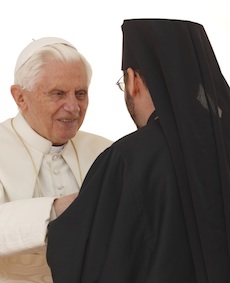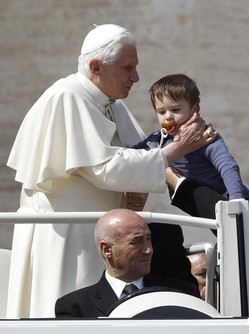James Martin reviews “Of Gods and Men”
The culture editor at America Magazine Jesuit Father James Martin, reviews the stunning movie “Of Gods and Men” on Religion and Ethics Newsweekly. His comments are worth hearing.
Focolare in the USA 50 years: celebrations at hand
This Sunday & coming Tuesday the lay ecclesial movement Focolare is celebrating their 50th anniversary in the United States of America.

Focolare Movement Sunday, April 3 at 2pm: Archbishop Timothy Dolan will
celebrate a Mass for the 50th anniversary of the Focolare Movement in North
America at St. Patrick’s Cathedral.
occasion of the 50th anniversary of the Focolare Movement’s presence in the
United States, this conference at Fordham University, “The Spirituality of
Unity: a Gift for our Times,” delves into the unique resources that the
Focolare spirituality of unity might offer for transcending divisions and
joining together to sustain constructive projects for the common good. Topics
for discussion include the “Economy of Communion,” featured in Pope Benedict’s
2009 social encyclical, Caritas in veritate; as well as the “Love of Neighbor
and the Law” interfaith project for lawyers, judges and law students.
interested may review the the program & register at: law.fordham.edu/unity.
Varkey Cardinal Vithayathil, C.SS.R., RIP
 Varkey Vithayathil, 84, a Redemptorist, bishop, cardinal and Major Archbishop for the Syro-Malabar Church (in India) died suddenly today of a heart attack at 2pm Ernakulam time.
Varkey Vithayathil, 84, a Redemptorist, bishop, cardinal and Major Archbishop for the Syro-Malabar Church (in India) died suddenly today of a heart attack at 2pm Ernakulam time.
Shevchuk talks about his election, chosen to lead a Church
Cindy Wooden’s CNS article, “Ukrainian archbishop says he was chosen ‘despite age to promote unity” on Archbishop Sviatoslav Shevchuk gives a clearer sense of the man and some of priorities. Wooden and Shevchuk met in Rome this week on the latter’s visit to Pope Benedict.
- to strengthen the proclamation of the Gospel (kērgma) and the teaching of the faith (didachē)
- to work on the Church’s liturgical theology and praxis; to make the liturgical patrimony intelligible in all the countries where the Ukrainian Catholic Church exists
- to develop programs that attack secularism and engages the positive secularity
- to strengthen the service of justice (diakonia)
- to promote unity in the Church and among the other churches
- to develop better social communications strategies for the Church
- to identify ways in which to inculturate the Gospel and Byzantine tradition
- to work with the Ukrainian people to heal from past injuries viz. the Russian Orthodox Church; to work on the fears that are paralyzing some members of the Church
- to dialogue and work with the Orthodox Churches in the Ukraine (and where the Church is present) on matters of theology and mutual human interest
- to promote healthy celibate and married vocations to religious life and priesthood.
“Reality holds a signature from God … we must seek to decipher”
In such a case, is awe, wonder, and joy at scientific
discoveries possible? When I was thinking about this, a friend sent me the text
of a speech given by Msgr. Luigi Giussani about the “love of being” that is
remarkably appropriate to this reflection. Giussani’s argument is that the truth of Christianity can be
verified by a proper consideration of the evidence for it. Evidence, he says,
is the correct word, even if the evidence for the Christian claim is given to
us through signs. Signs are things that can be touched, seen, and experienced. The Apostles had Jesus in front of them and this presence was a sign of His
victory over death, and therefore of His mysterious identity. But what about
us? What happens with the passage of time? What signs are there for us as
evidence of the truth of the Christian claim, of the reasonableness of the
Christian claim?
liberty, he says. In this drama, our liberty is a manifestation of our love for
being. Without this love for being we are not truly free and we will never
grasp the evidence of the signs given to us. At this point, as an example of
this love for being, Giussani invokes the Magi.
Continue reading “Reality holds a signature from God … we must seek to decipher”
Byran Kemper reverts to Catholicism…why?
 Coming to Christ –that’s what I am calling it when some comes into full communion with the Catholic Church (or Orthodoxy)– is not an easy thing for some people. Family, friends, employment, fear, and second-guessing the discernment can make “converting” all the more a royal pain. Only grace can sustain one’s move from one ecclesial body to another. A case in point has been those of the Anglican Communion coming to Catholic Church and now Byran Kemper, a baptized Catholic turn Presbyterian who founded the Stand True Ministries, among other things. Kemper is also the author of Social Justice Begins in the Womb (2010).
Coming to Christ –that’s what I am calling it when some comes into full communion with the Catholic Church (or Orthodoxy)– is not an easy thing for some people. Family, friends, employment, fear, and second-guessing the discernment can make “converting” all the more a royal pain. Only grace can sustain one’s move from one ecclesial body to another. A case in point has been those of the Anglican Communion coming to Catholic Church and now Byran Kemper, a baptized Catholic turn Presbyterian who founded the Stand True Ministries, among other things. Kemper is also the author of Social Justice Begins in the Womb (2010).
Atheists feast day
“Fools say in their hearts, ‘There is no God.'” ~Psalm
14:1. Happy feast day, atheists!
Pope Benedict XVI’s monthly prayer intentions for April 2011
Prayer is
consenting to unite our desire to God’s passion for our salvation. And, that’s what we’ll do…
The general
intention
That through its compelling preaching of the Gospel, the Church may
give young people new reasons for life and hope.
The missionary intention
That
by proclamation of the Gospel and the witness of their lives, missionaries may
bring Christ to those who do not yet know him.
Catholic Relief Services works to be present in the midst of suffering, a beacon of hope
Father Benedict Groeschel hosted Ken Hacket, the president of the Catholic Relief Services (CRS) on his weekly EWTN program, Sunday Night Live a few weeks ago. Since 1972 he’s worked in the missions. The program was a source of hope for me because it expanded my horizons of what we as Christians are meant to be: beacons of hope and compassion for others, not only in a time of need, but at all times. This organization clearly and proudly represents us doing good around the world. CRS is a great example of Christian charity!


